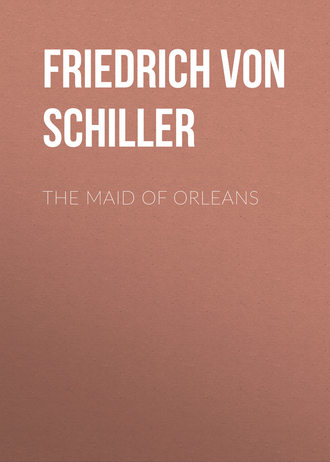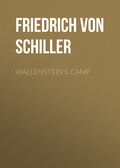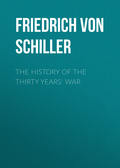полная версия

Фридрих Шиллер
The Maid of Orleans
SCENE VI
CHARLES, SOREL, DUCHATEL.
CHARLES
Is, then, the sceptre such a peerless treasure?
Is it so hard to loose it from our grasp?
Believe me, 'tis more galling to endure
The domineering rule of these proud vassals.
To be dependent on their will and pleasure
Is, to a noble heart, more bitter far
Than to submit to fate.
[To DUCHATEL, who still lingers.
Duchatel, go,
And do what I commanded.
DUCHATEL (throws himself at the KING'S feet)
Oh, my king!
CHARLES
No more! Thou'st heard my absolute resolve!
DUCHATEL
Sire, with the Duke of Burgundy make peace!
'Tis the sole outlet from destruction left!
CHARLES
Thou giv'st this counsel, and thy blood alone
Can ratify this peace.
DUCHATEL
Here is my head.
I oft have risked it for thee in the fight,
And with a joyful spirit I, for thee,
Would lay it down upon the block of death.
Conciliate the duke! Deliver me
To the full measure of his wrath, and let
My flowing blood appease the ancient hate.
CHARLES (looks at him for some time in silence, and with deep emotion)
Can it be true? Am I, then, sunk so low,
That even friends, who read my inmost heart,
Point out for my escape the path of shame?
Yes, now I recognize my abject fall.
My honor is no more confided in.
DUCHATEL
Reflect —
CHARLES
Be silent, and incense me not!
Had I ten realms, on which to turn my back,
With my friend's life I would not purchase them.
Do what I have commanded. Hence, and see
My equipage embarked.
DUCHATEL
'Twill speedily
Be done.
[He stands up and retires. AGNES SOREL weeps passionately.
SCENE VII
The royal palace at Chinon.
CHARLES, AGNES SOREL.
CHARLES (seizing the hand of AGNES)
My Agnes, be not sorrowful!
Beyond the Loire we still shall find a France;
We are departing to a happier land,
Where laughs a milder, an unclouded sky,
And gales more genial blow; we there shall meet
More gentle manners; song abideth there,
And love and life in richer beauty bloom.
SOREL
Oh, must I contemplate this day of woe!
The king must roam in banishment! the son
Depart, an exile from his father's house,
And turn his back upon his childhood's home!
Oh, pleasant, happy land that we forsake,
Ne'er shall we tread thee joyously again.
SCENE VIII
LA HIRE returns, CHARLES, SOREL.
SOREL
You come alone? You do not bring him back?
[Observing him more closely.
La Hire! What news? What does that look announce?
Some new calamity?
LA HIRE
Calamity
Hath spent itself; sunshine is now returned.
SOREL
What is it? I implore you.
LA HIRE (to the KING)
Summon back
The delegates from Orleans.
CHARLES
Why? What is it?
LA HIRE
Summon them back! Thy fortune is reversed.
A battle has been fought, and thou hast conquered.
SOREL
Conquered! Oh, heavenly music of that word!
CHARLES
La Hire! A fabulous report deceives thee;
Conquered! In conquest I believe no more.
LA HIRE
Still greater wonders thou wilt soon believe.
Here cometh the archbishop. To thine arms
He leadeth back Dunois.
SOREL
O beauteous flower
Of victory, which doth the heavenly fruits
Of peace and reconcilement bear at once!
SCENE IX
The same, ARCHBISHOP of RHEIMS, DUNOIS, DUCHATEL, with RAOUL, a Knight in armor.
ARCHBISHOP (leading DUNOIS to the KING, and joining their hands).
Princes, embrace! Let rage and discord cease, Since Heaven itself hath for our cause declared.
[DUNOIS embraces the KING.
CHARLES
Relieve my wonder and perplexity.
What may this solemn earnestness portend?
Whence this unlooked-for change of fortune?
ARCHBISHOP (leads the KNIGHT forward, and presents him to the KING)
Speak!
RAOUL
We had assembled sixteen regiments
Of Lotharingian troops to join your host;
And Baudricourt, a knight of Vaucouleurs,
Was our commander. Having gained the heights
By Vermanton, we wound our downward way
Into the valley watered by the Yonne.
There, in the plain before us, lay the foe,
And when we turned, arms glittered in our rear.
We saw ourselves surrounded by two hosts,
And could not hope for conquest or for flight.
Then sank the bravest heart, and in despair
We all prepared to lay our weapons down.
The leaders with each other anxiously
Sought counsel and found none; when to our eyes
A spectacle of wonder showed itself.
For suddenly from forth the thickets' depths
A maiden, on her head a polished helm,
Like a war-goddess, issued; terrible
Yet lovely was her aspect, and her hair
In dusky ringlets round her shoulders fell.
A heavenly radiance shone around the height;
When she upraised her voice and thus addressed us:
"Why be dismayed, brave Frenchmen? On the foe!
Were they more numerous than the ocean sands,
God and the holy maiden lead you on!"
Then quickly from the standard-bearer's hand
She snatched the banner, and before our troop
With valiant bearing strode the wondrous maid.
Silent with awe, scarce knowing what we did,
The banner and the maiden we pursue,
And fired with ardor, rush upon the foe,
Who, much amazed, stand motionless and view
The miracle with fixed and wondering gaze.
Then, as if seized by terror sent from God,
They suddenly betake themselves to flight,
And casting arms and armor to the ground,
Disperse in wild disorder o'er the field.
No leader's call, no signal now avails;
Senseless from terror, without looking back,
Horses and men plunge headlong in the stream,
Where they without resistance are despatched.
It was a slaughter rather than a fight!
Two thousand of the foe bestrewed the field,
Not reckoning numbers swallowed by the flood,
While of our company not one was slain.
CHARLES
'Tis strange, by heaven! most wonderful and strange!
SOREL
A maiden worked this miracle, you say?
Whence did she come? Who is she?
RAOUL
Who she is
She will reveal to no one but the king!
She calls herself a seer and prophetess
Ordained by God, and promises to raise
The siege of Orleans ere the moon shall change.
The people credit her, and thirst for war.
The host she follows – she'll be here anon.
[The ringing of bells is heard, together with the clang of arms.
Hark to the din! The pealing of the bells!
'Tis she! The people greet God's messenger.
CHARLES (to DUCHATEL)
Conduct her thither.
[To the ARCHBISHOP.
What should I believe?
A maiden brings me conquest even now,
When naught can save me but a hand divine!
This is not in the common course of things.
And dare I here believe a miracle?
MANY VOICES (behind the scene)
Hail to the maiden! – the deliverer!
CHARLES
She comes! Dunois, now occupy my place!
We will make trial of this wondrous maid.
Is she indeed inspired and sent by God
She will be able to discern the king.
[DUNOIS seats himself; the KING stands at his right hand, AGNES SOREL near him; the ARCHBISHOP and the others opposite; so that the intermediate space remains vacant.
SCENE X
The same. JOHANNA, accompanied by the councillors and many knights, who occupy the background of the scene; she advances with noble bearing, and slowly surveys the company.
DUNOIS (after a long and solemn pause)
Art thou the wondrous maiden —
JOHANNA (interrupts him, regarding him with dignity)
Bastard of Orleans, thou wilt tempt thy God!
This place abandon, which becomes thee not!
To this more mighty one the maid is sent.
[With a firm step she approaches the KING, bows one knee before him, and, rising immediately, steps back. All present express their astonishment, DUNOIS forsakes his seat, which is occupied by the KING.
CHARLES
Maiden, thou ne'er hast seen my face before.
Whence hast thou then this knowledge?
JOHANNA
Thee I saw
When none beside, save God in heaven, beheld thee.
[She approaches the KING, and speaks mysteriously.
Bethink thee, Dauphin, in the bygone night,
When all around lay buried in deep sleep,
Thou from thy couch didst rise and offer up
An earnest prayer to God. Let these retire
And I will name the subject of thy prayer.
CHARLES
What! to Heaven confided need not be
From men concealed. Disclose to me my prayer,
And I shall doubt no more that God inspires thee.
JOHANNA
Three prayers thou offeredst, Dauphin; listen now
Whether I name them to thee! Thou didst pray
That if there were appended to this crown
Unjust possession, or if heavy guilt,
Not yet atoned for, from thy father's times,
Occasioned this most lamentable war,
God would accept thee as a sacrifice,
Have mercy on thy people, and pour forth
Upon thy head the chalice of his wrath.
CHARLES (steps back with awe)
Who art thou, mighty one? Whence comest thou?
[All express their astonishment.
JOHANNA
To God thou offeredst this second prayer:
That if it were his will and high decree
To take away the sceptre from thy race,
And from thee to withdraw whate'er thy sires,
The monarchs of this kingdom, once possessed,
He in his mercy would preserve to thee
Three priceless treasures – a contented heart,
Thy friend's affection, and thine Agnes' love.
[The KING conceals his face: the spectators express their astonishment. After a pause.
Thy third petition shall I name to thee?
CHARLES
Enough; I credit thee! This doth surpass
Mere human knowledge: thou art sent by God!
ARCHBISHOP
Who art thou, wonderful and holy maid?
What favored region bore thee? What blest pair,
Beloved of Heaven, may claim thee as their child?
JOHANNA
Most reverend father, I am named Johanna,
I am a shepherd's lowly daughter, born
In Dom Remi, a village of my king.
Included in the diocese of Toul,
And from a child I kept my father's sheep.
And much and frequently I heard them tell
Of the strange islanders, who o'er the sea
Had come to make us slaves, and on us force
A foreign lord, who loveth not the people;
How the great city, Paris, they had seized,
And had usurped dominion o'er the realm.
Then earnestly God's Mother I implored
To save us from the shame of foreign chains,
And to preserve to us our lawful king.
Not distant from my native village stands
An ancient image of the Virgin blest,
To which the pious pilgrims oft repaired;
Hard by a holy oak, of blessed power,
Standeth, far-famed through wonders manifold.
Beneath the oak's broad shade I loved to sit
Tending my flock – my heart still drew me there.
And if by chance among the desert hills
A lambkin strayed, 'twas shown me in a dream,
When in the shadow of this oak I slept.
And once, when through the night beneath this tree
In pious adoration I had sat,
Resisting sleep, the Holy One appeared,
Bearing a sword and banner, otherwise
Clad like a shepherdess, and thus she spake:
"'Tis I; arise, Johanna! leave thy flock,
The Lord appoints thee to another task!
Receive this banner! Gird thee with this sword!
Therewith exterminate my people's foes;
Conduct to Rheims thy royal master's son,
And crown him with the kingly diadem!"
And I made answer: "How may I presume
To undertake such deeds, a tender maid,
Unpractised in the dreadful art of war!"
And she replied: "A maiden pure and chaste
Achieves whate'er on earth is glorious
If she to earthly love ne'er yields her heart.
Look upon me! a virgin, like thyself;
I to the Christ, the Lord divine, gave birth,
And am myself divine!" Mine eyelids then
She touched, and when I upward turned my amaze,
Heaven's wide expanse was filled with angel-boys,
Who bore white lilies in their hands, while tones
Of sweetest music floated through the air.
And thus on three successive nights appeared
The Holy One, and cried, – "Arise, Johanna!
The Lord appoints thee to another task!"
And when the third night she revealed herself,
Wrathful she seemed, and chiding spake these words:
"Obedience, woman's duty here on earth;
Severe endurance is her heavy doom;
She must be purified through discipline;
Who serveth here, is glorified above!"
While thus she spake, she let her shepherd garb
Fail from her, and as Queen of Heaven stood forth
Enshrined in radiant light, while golden clouds
Upbore her slowly to the realms of bliss.
[All are moved; AGNES SOREL weeping, hides her face on the bosom of the KING.
ARCHBISHOP (after a long pause)
Before divine credentials such as these
Each doubt of earthly prudence must subside,
Her deeds attest the truth of what she speaks,
For God alone such wonders can achieve.
DUNOIS
I credit not her wonders, but her eyes
Which beam with innocence and purity.
CHARLES
Am I, a sinner, worthy of such favor?
Infallible, All-searching eye, thou seest
Mine inmost heart, my deep humility!
JOHANNA
Humility shines brightly in the skies;
Thou art abased, hence God exalteth thee.
CHARLES
Shall I indeed withstand mine enemies?
JOHANNA
France I will lay submissive at thy feet!
CHARLES
And Orleans, say'st thou, will not be surrendered?
JOHANNA
The Loire shall sooner roll its waters back.
CHARLES
Shall I in triumph enter into Rheims?
JOHANNA
I through ten thousand foes will lead you there.
[The knights make a noise with their lances and shields, and evince signs of courage.
DUNOIS
Appoint the maiden to command the host!
We follow blindly whereso'er she leads!
The Holy One's prophetic eye shall guide,
And this brave sword from danger shall protect her!
LA HIRE
A universe in arms we will not fear,
If she, the mighty one, precede our troops.
The God of battle walketh by her side;
Let her conduct us on to victory!
[The knights clang their arms and step forward.
CHARLES
Yes, holy maiden, do thou lead mine host;
My chiefs and warriors shall submit to thee.
This sword of matchless temper, proved in war,
Sent back in anger by the Constable,
Hath found a hand more worthy. Prophetess,
Do thou receive it, and henceforward be —
JOHANNA
No, noble Dauphin! conquest to my liege
Is not accorded through this instrument
Of earthly might. I know another sword
Wherewith I am to conquer, which to thee,
I, as the Spirit taught, will indicate;
Let it be hither brought.
CHARLES
Name it, Johanna.
JOHANNA
Send to the ancient town of Fierbois;
There in Saint Catherine's churchyard is a vault
Where lie in heaps the spoils of bygone war.
Among them is the sword which I must use.
It by three golden lilies may be known,
Upon the blade impressed. Let it be brought
For thou, my liege, shalt conquer through this sword.
CHARLES
Perform what she commands.
JOHANNA
And a white banner,
Edged with a purple border, let me bear.
Upon this banner let the Queen of Heaven
Be pictured with the beauteous Jesus child
Floating in glory o'er this earthly ball.
For so the Holy Mother showed it me.
CHARLES
So be it as thou sayest.
JOHANNA (to the ARCHBISHOP)
Reverend bishop;
Lay on my head thy consecrated hands!
Pronounce a blessing, Father, on thy child!
[She kneels down.
ARCHBISHOP
Not blessings to receive, but to dispense
Art thou appointed. Go, with power divine!
But we are sinners all and most unworthy.
[She rises: a PAGE enters.
PAGE
A herald from the English generals.
JOHANNA
Let him appear, for he is sent by God!
[The KING motions to the PAGE, who retires.
SCENE XI
The HERALD. The same.
CHARLES
Thy tidings, herald? What thy message! Speak!
HERALD
Who is it, who for Charles of Valois,
The Count of Pointhieu, in this presence speaks?
DUNOIS
Unworthy herald! base, insulting knave!
Dost thou presume the monarch of the French
Thus in his own dominions to deny?
Thou art protected by thine office, else —
HERALD
One king alone is recognized by France,
And he resideth in the English camp.
CHARLES
Peace, peace, good cousin! Speak thy message, herald!
HERALD
My noble general laments the blood
Which hath already flowed, and still must flow.
Hence, in the scabbard holding back the sword,
Before by storm the town of Orleans falls,
He offers thee an amicable treaty.
CHARLES
Proceed!
JOHANNA (stepping forward)
Permit me, Dauphin, in thy stead,
To parley with this herald.
CHARLES
Do so, maid!
Determine thou, for peace, or bloody war.
JOHANNA (to the HERALD)
Who sendeth thee? Who speaketh through thy mouth?
HERALD
The Earl of Salisbury; the British chief.
JOHANNA
Herald, 'tis false! The earl speaks not through thee.
Only the living speak, the dead are silent.
HERALD
The earl is well, and full of lusty strength;
He lives to bring down ruin on your heads.
JOHANNA
When thou didst quit the British army he lived.
This morn, while gazing from Le Tournelle's tower,
A ball from Orleans struck him to the ground.
Smilest thou that I discern what is remote?
Not to my words give credence; but believe
The witness of thine eyes! his funeral train
Thou shalt encounter as you goest hence!
Now, herald, speak, and do thine errand here.
HERALD
If what is hidden thou canst thus reveal,
Thou knowest mine errand ere I tell it thee.
JOHANNA
It boots me not to know it. But do thou
Give ear unto my words! This message bear
In answer to the lords who sent thee here.
Monarch of England, and ye haughty dukes,
Bedford and Gloucester, regents of this realm!
To heaven's high King you are accountable
For all the blood that hath been shed. Restore
The keys of all the cities ta'en by force
In opposition to God's holy law!
The maiden cometh from the King of Heaven
And offers you or peace or bloody war.
Choose ye! for this I say, that you may know it:
To you this beauteous realm is not assigned
By Mary's son; – but God hath given it
To Charles, my lord and Dauphin, who ere long
Will enter Paris with a monarch's pomp,
Attended by the great ones of his realm.
Now, herald, go, and speedily depart,
For ere thou canst attain the British camp
And do thine errand, is the maiden there,
To plant the sign of victory at Orleans.
[She retires. In the midst of a general movement, the curtain falls.
ACT II
Landscape, bounded by rocks.
SCENE I
TALBOT and LIONEL, English generals, PHILIP, DUKE OF BURGUNDY, FASTOLFE, and CHATILLON, with soldiers and banners.
TALBOT
Here let us make a halt beneath these rocks,
And pitch our camp, in case our scattered troops,
Dispersed in panic fear, again should rally.
Choose trusty sentinels, and guard the heights!
'Tis true the darkness shields us from pursuit,
And sure I am, unless the foe have wings,
We need not fear surprisal. Still 'tis well
To practice caution, for we have to do
With a bold foe, and have sustained defeat.
[FASTOLFE goes out with the soldiers.
LIONEL
Defeat! My general, do not speak that word.
It stings me to the quick to think the French
To-day have seen the backs of Englishmen.
Oh, Orleans! Orleans! Grave of England's glory!
Our honor lies upon thy fatal plains
Defeat most ignominious and burlesque!
Who will in future years believe the tale!
The victors of Poictiers and Agincourt,
Cressy's bold heroes, routed by a woman?
BURGUNDY
That must console us. Not by mortal power,
But by the devil have we been o'erthrown!
TALBOT
The devil of our own stupidity!
How, Burgundy? Do princes quake and fear
Before the phantom which appals the vulgar?
Credulity is but a sorry cloak
For cowardice. Your people first took flight.
BURGUNDY
None stood their ground. The flight was general.
TALBOT
'Tis false! Your wing fled first. You wildly broke
Into our camp, exclaiming: "Hell is loose,
The devil combats on the side of France!"
And thus you brought confusion 'mong our troops.
LIONEL
You can't deny it. Your wing yielded first.
BURGUNDY
Because the brunt of battle there commenced.
TALBOT
The maiden knew the weakness of our camp;
She rightly judged where fear was to be found.
BURGUNDY
How? Shall the blame of our disaster rest
With Burgundy?
LIONEL
By heaven! were we alone,
We English, never had we Orleans lost!
BURGUNDY
No, truly! for ye ne'er had Orleans seen!
Who opened you a way into this realm,
And reached you forth a kind and friendly hand
When you descended on this hostile coast?
Who was it crowned your Henry at Paris,
And unto him subdued the people's hearts?
Had this Burgundian arm not guided you
Into this realm, by heaven you ne'er had seen
The smoke ascending from a single hearth!
LIONEL
Were conquests with big words effected, duke,
You, doubtless, would have conquered France alone.
BURGUNDY
The loss of Orleans angers you, and now
You vent your gall on me, your friend and ally.
What lost us Orleans but your avarice?
The city was prepared to yield to me,
Your envy was the sole impediment.
TALBOT
We did not undertake the siege for you.
BURGUNDY
How would it stand with you if I withdrew
With all my host?
LIONEL
We should not be worse off
Than when, at Agincourt, we proved a match
For you and all the banded power of France.
BURGUNDY
Yet much you stood in need of our alliance;
The regent purchased it at heavy cost.
TALBOT
Most dearly, with the forfeit of our honor,
At Orleans have we paid for it to-day.
BURGUNDY
Urge me no further, lords. Ye may repent it!
Did I forsake the banners of my king,
Draw down upon my head the traitor's name,
To be insulted thus by foreigners?
Why am I here to combat against France?
If I must needs endure ingratitude,
Let it come rather from my native king!
TALBOT
You're in communication with the Dauphin,
We know it well, but we soon shall find means
To guard ourselves 'gainst treason.
BURGUNDY
Death and hell!
Am I encountered thus? Chatillon, hark!
Let all my troops prepare to quit the camp.
We will retire into our own domain.
[CHATILLON goes out.
LIONEL
God speed you there! Never did Britain's fame
More brightly shine than when she stood alone,
Confiding solely in her own good sword.
Let each one fight his battle for himself,
For 'tis eternal truth that English blood
Cannot, with honor, blend with blood of France.







